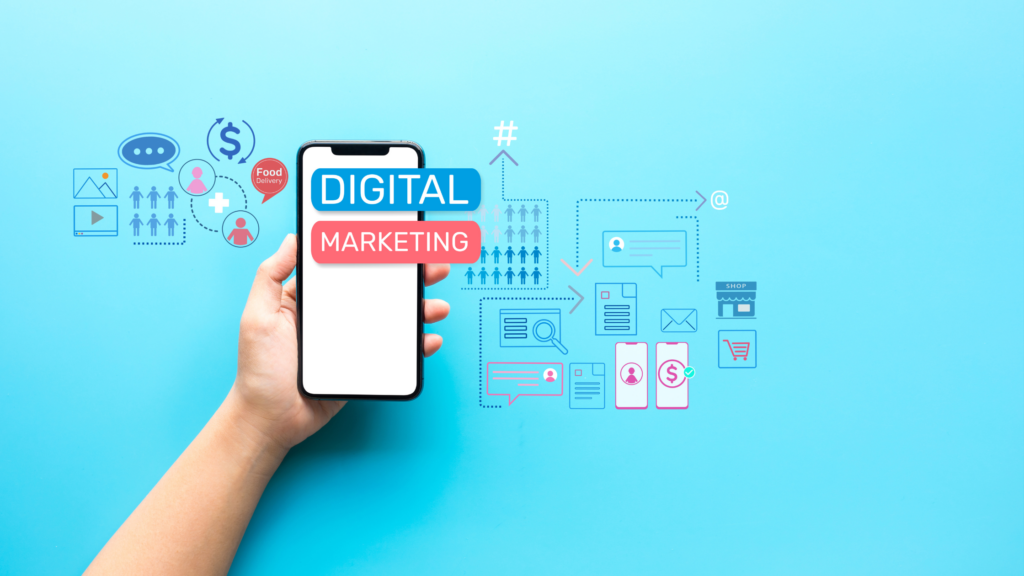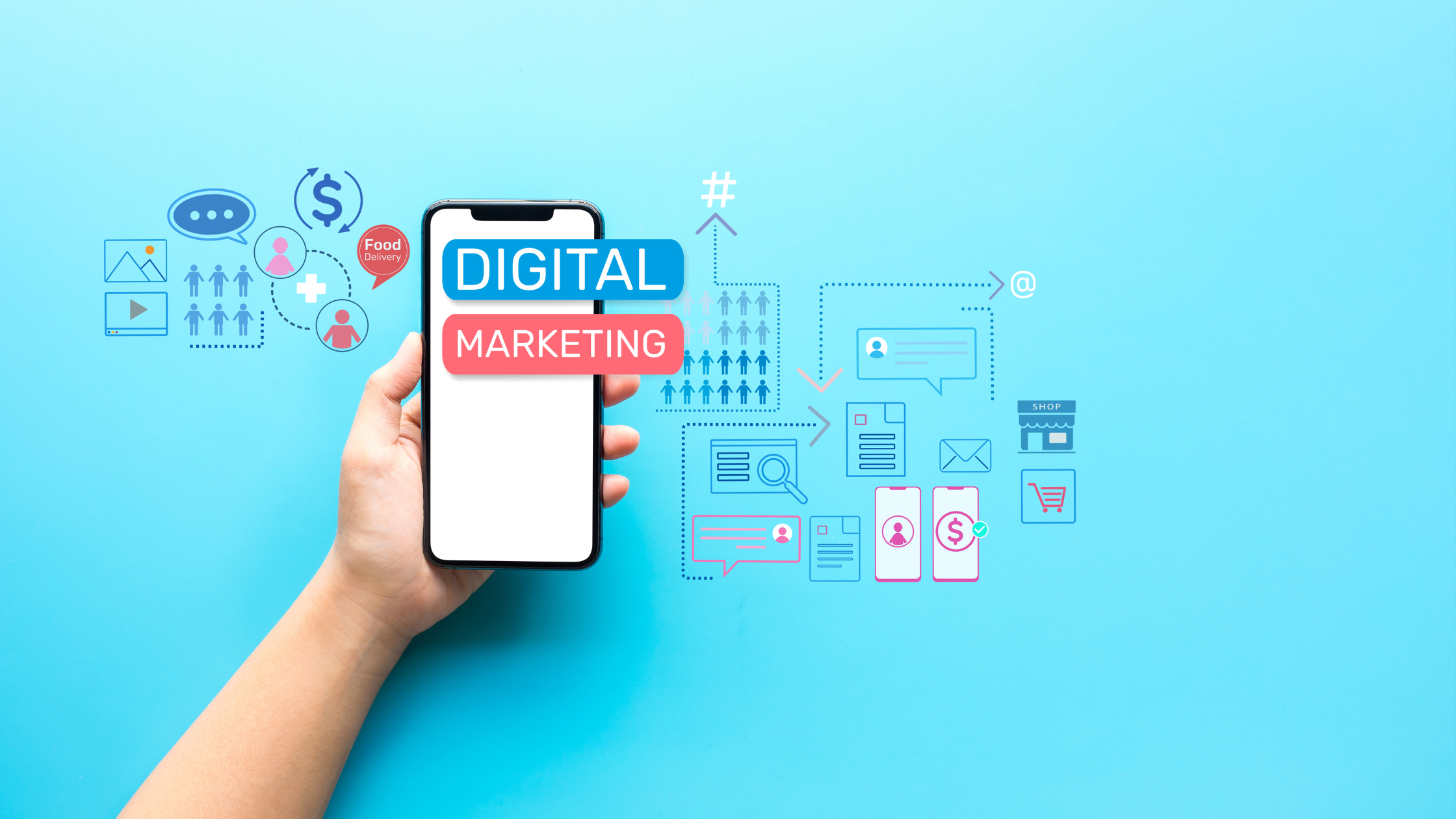
Charting the Digital Landscape
In today’s digital age, the question isn’t if your small business should go online. It’s about how quickly and successfully it can do so. Imagine the internet as a huge ocean. Consider digital marketing as the map and compass. It leads small businesses to uncharted territory and untapped rewards. Those who want to prosper in the face of the digital revolution must take this trip. It’s necessary, not optional. Let’s explore the importance of digital marketing. It’s a guide that small businesses use when navigating today’s business climate.
The Evolution of Engagement: From Traditional Paths to Digital Highways
The shift from conventional marketing methods to digital platforms is like the transition from horse-drawn carriages to supersonic aircraft. The way we communicate, learn, and make judgments about what to buy is changing. This change is reflected in the evolution of marketing methods. In the past, a neighborhood may be drawn in by a prominent billboard or a well placed ad in the local newspaper. These days, the internet world opens up that community to a worldwide audience. It allows small enterprises to communicate with their prospective clients worldwide.
Digital marketing does more than increase visibility. It also brings small businesses into a realm where precision, adaptability, and interaction are key components. Businesses can use tools like SEO, social media, and email marketing to engage in two-way conversations with their audience. They can also tailor their messaging to meet specific needs. They can pivot strategies based on real-time data. With this dynamic approach, marketing becomes a dialogue instead of a shouting fight, resulting in deeper connections and a devoted clientele.
Navigating the Digital Cosmos: A Must for Small Businesses
For small businesses, the digital cosmos is both a battleground and a playground. Reputations are created, brands are established, and client loyalty is gained at this place. Search engines become channels for discovery. Social media platforms become storytelling spaces. Emails become customized messages that speak to the person, not the audience. The ability to access a global market is made possible for small businesses by the internet’s global reach and the focused accuracy of digital marketing methods.
Consumer behavior has fundamentally changed. Digital marketing is now essential for small businesses. Consumers of today use the internet for everything from preliminary research to making final purchases. They are online natives. Taking a digital marketing approach entails reaching your audience where they are. It means providing them with value and helping them with their customer journey in an easy-to-navigate way. It’s about being present, relevant, and active in a space where the currency of the realm is attention.
It’s obvious that digital marketing is essential for small businesses to have in their toolset. Success in the digital world depends on it, rather than just survival. Small businesses can successfully navigate the internet’s tumultuous waters. They can do so by using digital marketing. This allows them to reach new customers, engage with them more deeply, and create enduring relationships that foster development and success. Digital marketing is the north star that points small businesses in the direction of their goals in the vast digital world.

Key Benefits of Digital Marketing for Small Businesses
1. Expanded Audience Reach
Think of your business as a fisherman in a vast ocean. Traditional marketing is like fishing with a small net close to shore; you catch fish, but only near you. Digital marketing lets you cast a wider net, using your website and social media to catch customers from all over the world. It’s about reaching more people than you ever could just standing on the dock.
The physical barriers that formerly restricted small enterprises are eliminated by digital marketing. With just a few clicks, a modest Parisian boutique can reach customers in Tokyo, New York, or anywhere in between. This is thanks to the power of internet platforms. This worldwide reach is revolutionary. It reaches a much larger audience than local foot traffic or regional advertising. Forbes emphasizes the value of digital marketing for growing your company’s reach. It also shows how it can engage with clients anywhere in the world. It doesn’t require a physical location.
2. Cost Efficiency
If you’ve ever paid for a newspaper ad, you know it can be pricey, and you’re never quite sure who sees it. Digital marketing is like putting up a billboard in the virtual world. You only pay when someone interested actually looks at it. It’s cheaper because you can target your ad to show only to people likely interested in what you’re selling. For example, you can show a toy ad only to kids, not to everyone.
When compared to traditional approaches, digital marketing presents a more economical option. Small businesses can gain substantial exposure without paying high prices for TV or print ads. They can use organic SEO and affordable social media advertising. HubSpot claims that smaller firms can achieve more return on investment from their marketing spend through the use of digital marketing, which results in more accurate budget control and lower cost per acquisition.
3. Increased Awareness of Your Brand
Imagine you’re at a huge concert, and you want to be seen from the stage. In the world of business, SEO (search engine optimization) and social media are your flashy signs and bright lights. They help your business stand out in the crowded internet concert. They make sure customers can see you easily, even from the back row.
Brand exposure thrives in the digital sphere. SEO strategies put your company in front of customers. They are actively looking for your goods or services. Social media and content marketing provide you a platform to share the voice and principles of your brand. Moz’s Beginner’s Guide to SEO highlights the transformative power of SEO. It increases online exposure and brings more targeted visitors to your website. Social Media Examiner provides insights on using social media platforms. It aims to raise brand awareness. It also helps establish a personal connection with your audience. Similarly, it helps build a personal connection with your audience.
4. Increased Sales and Revenue
Digital marketing helps you talk directly to people interested in your product or service, like sending an invitation to a party. It makes it easier for them to say “yes” and buy what you’re selling. This is because you can show them ads or send emails that feel personal. It’s like you’re having a one-on-one conversation, which leads to more sales.
Digital marketing is recognized for increasing conversion rates and revenues. It is characterized by targeted advertising and personalized marketing. Platforms like Google Ads and Meta (Facebook) Ads enable creating hyper-targeted campaigns that focus on specific demographics, interests, and behaviors. This significantly increases the chance of conversion. Businesses using tailored and focused marketing techniques report notable increases in consumer engagement and sales results. This is according to a CMO Survey.
5. Data-Driven Decision Making
In the old days, businesses guessed where to sail their ship, hoping to find land. Now, imagine having a map and compass showing where the treasures are. Digital marketing gives you tools like Google Analytics. They help you see who’s visiting your website, what they like, and what doesn’t interest them. This means you can make smarter decisions, like a captain steering towards treasure, not just empty ocean.
Data-driven decision-making is one of the most persuasive benefits of digital marketing. Analytics solutions help firms improve and optimize their marketing strategies. They do so by giving them useful insights into customer behavior, campaign performance, and return on investment. Google Analytics is a vital tool. It provides comprehensive information on user behavior, website traffic trends, and conversion metrics. This enables organizations to make well-informed, strategic decisions.
Essential Elements of Digital Marketing for Small Companies
Understanding digital marketing doesn’t have to be like learning a new language. It’s about using the internet to get your business noticed by more people, in more places without spending a fortune. It’s about making sure when someone is looking for what you offer, they find you easily. It’s like a lighthouse guiding ships safely to shore. It’s about using information to make smarter choices. This ensures your business not only survives but thrives in the digital world.
Knowing these advantages is only the first step. A strong digital marketing strategy must include essential elements. These include search engine optimization, social media marketing, email marketing, content marketing, and analytics. Each is essential to creating a comprehensive online presence. It boosts consumer engagement, spurs growth, and produces better business results overall.
Small businesses need tactics and technologies to navigate the complex digital landscape. They aim for visibility, engagement, and long-term success. Small businesses can realize their full potential and soar to new heights in the cutthroat online marketplace. They can do this by adopting the digital marketing revolution.

1. SEO and Local SEO: Being Found Online
Envision possessing a treasure map that’s concealed amidst a plethora of others. Search Engine Optimization, or SEO, is similar to adding a glow to your map so that anyone looking for treasure (or, in this case, your business) can quickly locate it among the rest. Even more awesome is local SEO; it’s like letting treasure hunters know you live right next door. Saying something like, “Hey, there’s treasure right in your backyard!” Using relevant keywords in your location and services can make it easier for people in the area to locate you.
Learning Resources:
- Moz’s Beginner’s Guide to SEO: A comprehensive resource for understanding the basics of SEO, including keyword research and link building.
- Google’s SEO Starter Guide: Google offers its own guide for beginners, which is a goldmine for understanding how to optimize for search engines.
Tips and Tricks:
- Use local keywords in your content and meta tags to boost local SEO. Use Google’s Keyword Planner to find keywords
- Claim your Google My Business listing to enhance your visibility in local search results.
- Regularly update your content to keep it fresh and relevant.
2. Content Marketing: Sharing Your Story
Telling stories around a campfire is similar to content marketing. However, instead of the campfire being your website or blog, your stories are told online. But these aren’t just any stories. They’re engaging, informative, and just what your audience is looking for. You keep people reading (or listening). You also establish yourself as the authority in your field. You do this by giving useful information, such as how-tos, guides, or recommendations. Like the campfire storyteller that everyone looks forward to hearing from.
Learning Resources:
- HubSpot’s Content Marketing Certification: A free course that covers all aspects of content marketing strategy.
- Content Marketing Institute: Offers a wide range of articles, whitepapers, and guides on content marketing strategies.
Tips and Tricks:
- Focus on creating value-driven content that addresses your audience’s pain points.
- Use various formats like blogs, videos, and infographics to engage different types of learners.
- Promote your content across your social media platforms to increase its reach.
3. Social Media Engagement: Making Friends Online
Being active on social media is like attending a big party. All of your clients are there. Simply showing there is insufficient. You also need to interact with others. Strike up discussions. Share your experiences. Genuinely listen to what people have to say. You develop relationships by being active and engaged on social media sites. These include Facebook, Instagram, and Twitter. It’s similar to making party friends who are excited to brag about you to others.
Learning Resources:
- Social Media Examiner: Provides articles and reports on the latest social media trends and how to use them for business.
- Hootsuite’s Social Media Marketing Courses: Offers training on how to leverage social media for marketing effectively.
Tips and Tricks:
- Engage with your followers by responding to comments and messages promptly.
- Use hashtags strategically to increase the visibility of your posts.
- Post consistently and use analytics to understand the best times to post for your audience.
4. Email Marketing: Keeping in Touch
Consider email marketing like mailing postcards to stay in touch with friends. Your clients are your friends and emails are used in place of postcards. But these aren’t just any old messages. Instead, they’re customized notes. These notes convey offers, news, and practical advice. They’re based on the interests of each individual recipient. It’s a method of saying to your clients, “Hey, check us out—we have something you might like!” By doing this, you may keep your company in their thoughts. You might even entice them to return or forward your emails to others.
Learning Resources:
- Mailchimp’s Email Marketing Guide: Offers insights into email marketing strategies, design tips, and how to measure success.
- Constant Contact’s Blog: Provides useful articles on email marketing best practices and tips.
Tips and Tricks:
- Segment your email list. Send more personalized and relevant content to different groups.
- Include clear and compelling calls to action in your emails.
- Test different subject lines and email formats to see what works best with your audience.
Using Digital Marketing to Your Advantage
Each element is essential for helping your small business navigate the digital terrain. Email marketing continues the dialogue. Social media forges connections. Content marketing tells your story. SEO illuminates the route to your door. When combined, they provide a potent plan. It can assist your company in thriving rather than merely existing online. Remember that digital marketing is about more than selling. It’s also about interacting, connecting, and developing a relationship with your clients.

Overcoming Challenges in Digital Marketing
Sailing Through Stormy Seas
Venturing into digital marketing can sometimes feel like setting sail in unpredictable weather. Small businesses often navigate limited resources and changing digital trends. Yet, every seasoned captain knows the value of a good compass and a sturdy ship.
Strategies for Weathering the Digital Gale
Harness the Wind with Cost-Effective Tools: Imagine your digital marketing tools as sails on your vessel, catching the wind without costing a fortune in gold. Use platforms like Canva for your visual treasure maps (graphics). Use Hootsuite to chart your course through social media seas. Use Google Analytics as your lookout in the crow’s nest. It offers insights into the waters ahead.
Navigate by the Stars with Continuous Learning: The digital realm’s landscape shifts like the constellations. Keep your maps updated by following the celestial guides offered by HubSpot and Moz. Their insights are like the North Star, guiding you through the night.
Trim Your Sails: Not every gust of wind is worth catching. Focus on the strategies that propel you forward. If TikTok dances don’t call to your audience, don’t choreograph a jig. Concentrate on the currents that bring you closer to uncharted islands (new customers).
Form a Fleet: The sea is less daunting with allies. Join digital marketing armadas, like forums and local business groups. Here, you can share tales, exchange maps, and sometimes sail toward mutual goals.
The Beacon of Digital Marketing
In the vast ocean of commerce, digital marketing is like a lighthouse. It guides small businesses to safe harbor. It’s not just about selling goods. It’s also about signaling your presence in the fog. You connect with lost ships and guide them home to your dock. This beacon is crucial, not just for survival, but for discovery and exploration in the digital age.
Chart Your Course
Now, with the horizon in sight, it’s time to hoist your sails and embark on your digital marketing voyage:
Plot Your Journey: With your destination in mind, draw up a chart (plan) that marks the route. Each business is a unique vessel, and your course should reflect your distinct shape and colors.
Gather Your Crew (Knowledge): Equip yourself with the skills and insights needed to navigate these waters. The resources mentioned are your crew, ready to work the ropes and steer the ship.
Sail, Observe, Adjust: Set sail with your strategy, keep a keen eye on the stars (analytics), and be ready to adjust your sails. The sea changes, and so should you, adapting to the currents and the weather.
Embark on this journey with heart and courage. The digital marketing seas are wide and full of potential. With the right approach, your small business can find new lands, treasure, and glory beyond the horizon.
As your digital marketing journey unfolds, remember: the path is yours to choose. You can harness the expertise of seasoned navigators. Or, chart your own course through self-education. In the digital realm, opportunity is abundant. For those seeking guidance, we are ready to steer your ship through the tumultuous seas of online marketing. We will make sure you reach your destination with ease and efficiency. Yet, for the intrepid explorers eager to learn the ropes themselves, the world of digital marketing offers a treasure trove of knowledge waiting to be unearthed.

Further Learning Resources
Embark on your quest for digital mastery with these curated resources, each a beacon of knowledge designed to illuminate your way:
Google Digital Garage: A treasure chest of free courses on digital marketing, SEO, and data analytics, perfect for those starting their journey. Visit Google Digital Garage
HubSpot Academy: Offers comprehensive courses in digital marketing, content marketing, and social media strategy, free for marketing adventurers. Explore HubSpot Academy
Meta (Facebook) Blueprint: Master the art of Meta Ads with courses for all levels, focusing on harnessing the power of Facebook and Instagram. Check out Facebook Blueprint
LinkedIn Learning: Dive into a sea of digital marketing strategies with subscription-based access to expert-led courses. Discover courses on LinkedIn Learning
Coursera & edX: For those seeking deeper knowledge, these platforms offer courses and specializations in digital marketing from top universities. Find courses on Coursera and edX
Digital Marketing Institute: Navigate towards professional excellence with in-depth courses and diplomas in digital marketing. Learn more at the Digital Marketing Institute
SEO-Specific Resources: Embark on an SEO adventure with Moz’s Beginner’s Guide to SEO or SEMrush Academy, offering foundational guides to optimize your online presence. Start with Moz and SEMrush Academy
DesignRush: For educational institutions, DesignRush lists top marketing agencies specializing in higher education, helping you find the perfect partner to elevate your strategy. Discover the Best Higher Education Marketing Agencies on DesignRush
In the ever-changing world of digital marketing, the pursuit of knowledge is endless.
These resources serve as your compass. They guide you through the complexities of online marketing. They provide insights, skills, and the confidence to navigate the digital landscape. You can partner with experts or forge your own path. The horizon is bright for those who embrace continuous learning and adaptation.
Set Sail Towards Success
The digital age beckons, offering boundless opportunities for growth, connection, and exploration. Embrace digital marketing as your vessel to navigate these waters. Chart a course toward success that is uniquely yours. The journey begins with a single step—or click. It’s a step towards learning, understanding, and mastering the digital domain. The time is now: raise the anchor, unfurl the sails, and embark on your digital marketing odyssey.

View comments
+ Leave a comment